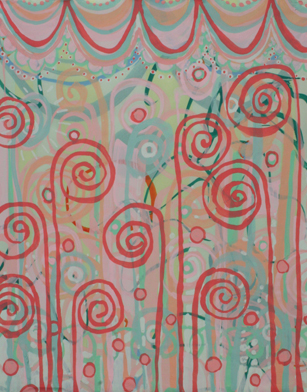As artists we strive to be authentic. We search for truth as we take something unseen and bring it to light. Our creativity is born of our unique vision, heart, and soul. It's hard then to see the concept of making a sale as fitting in with this pure self-expression. Time and again, through mass media and even our own artistic creations (particularly film and TV), we've been shown that salespeople are inauthentic. At best they're shallow and pleasantly disconnected (the QVC archetype), and at worst they're slimy, underhanded manipulators greedy for our hard-earned cash (the Snake Oil archetype).
With this kind of spectrum we're naturally repelled by the idea of trying to sell something.
We take the day job and keep art as a side gig or hobby, so it remains untarnished by the murky underworld of money. Yet, we simultaneously lament our lack of time and opportunity when it comes to our art.
Time and again artists who become successful at selling their own wares are seen as "sell-outs," the art world's dirtiest word and most scathing insult.
We've come to believe that artists who achieve status as not only full-time artists, but financially sound ones at that, lose something in the process - their soul, their vision, their edge.
This is unfair and a double standard. We can't yearn for a culture that supports artists then criticize those who receive support - monetary or otherwise. At this point in our cultural history, sales is no longer something to shy away from due to an outdated belief that doing so requires pimping a product we don't care about to an unsuspecting audience.
Selling is simply about finding a compatible home for the work we make so we can continue to make it. Today, artists who want to be doing it full-time must embrace making a living from their art, and understand that our creative expression doesn't just remain intact in the face of money, but thrives with the acquisition of it.
Truthfully, when we're turned off by someone promoting themselves it's not that they're promoting themselves, it's how they're doing it.
Being authentic is easier than ever. Thanks to the internet and social media we can now directly connect our daily lives with a growing audience. We can share images or thoughts about our creative process. We can ask questions to engage with fans, or for informative feedback. We can show works-in-progress, bringing people into the fold as we navigate our way through creation. We can even post about our kids, our animals, our food and more.
We can do these things, and we should if we want to be financially successful. These authentic day-to-day offerings are how we share our essence and our work with people we feel aligned with, people who want to own what we make. It's time for creative folks to show up, be visible, and let go of the idea that it's wrong to promote our work. The world needs successful, authentic, creative people who embrace their life's purpose by allowing themselves to be supported.
And, hey, even if you put yourself out there and don't make many sales for whatever reason (a reason you'll likely uncover if you keep at it), you can be sure that sharing your creative work will inspire other potential creators to express themselves, or encourage fellow artists to show up and be seen too.
If you want to learn to become a better receiver - of joy, pleasure, money, creativity, and more - please join me for theTao of Receivingonline program starting May 24, 2015!
Photo by MartinaK15/cc












